#john g. heller
Explore tagged Tumblr posts
Text

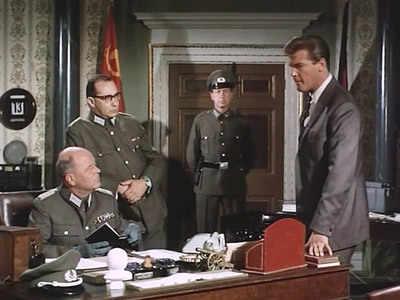
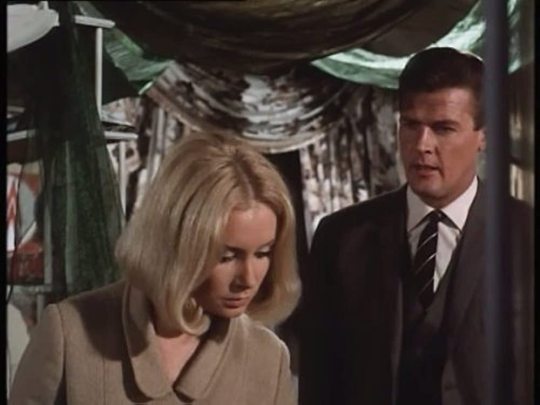
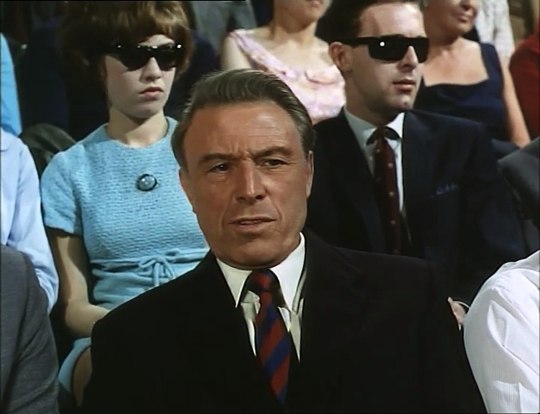


The Saint: Paper Chase (5.11, ITC, 1966)
"Have you the file?"
"We have outraged Mr. Redman's sense of fair play. How British you have become. The Marquess of Queensberry Rules, even in a fight to the death."
#the saint#paper chase#itc#leslie charteris#1966#leslie norman#harry w. junkin#michael cramoy#roger moore#ronald hines#niall macginnis#penelope horner#gordon gostelow#jack gwillim#carl duering#michael beint#steve plytas#tony wager#norma west#john g. heller#hans de vries#paul williamson#gordon sterne#frank maher#Gwillim's British Intelligence boss from 5.5 returns and once again Simon is strong armed into doing some spy stuff for queen and country#(but fr why not send the actual spies... John Drake could have done this job with a lot less showing off). a high octane action heavy ep#which presents a fairly simple plot to get Simon into East Berlin and then spends most of the episode on the adventure to get out again#it all feels like it might owe a debt to The Spy Who Came In from the Cold‚ a big screen hit the previous year‚ and even the downbeat#ending feels more le carre than fleming. partly a return to moodier and more realist form‚ except that Simon working for mi5 or 6 feels in#and of itself kind of silly... i mean he's a rich playboy jewel thief. still‚ MacGinnis (a considerable get for the team) is great fun
11 notes
·
View notes
Text
The Karate Kid (1984)

Before today, I had never seen The Karate Kid. I assumed the love directed towards it came from nostalgia and the film being released at the right time, in the right environment. I couldn��t have been more wrong. This is a sweet, surprisingly deep crowd-pleaser with many memorable scenes to go with its iconic characters and great performances.
In 1984, Daniel LaRusso (Ralph Macchio) and his mother (Randee Heller) move from Newark to Los Angeles. After befriending Ali Mills (Elisabeth Shue), Daniel is beaten by her jealous ex-boyfriend, a karate black belt named Johnny (Billy Zabka). Taking pity upon Daniel is Mr. Miyagi (Noriyuki “Pat” Morita), who senses that Johnny and his gang’s bad behavior stems from their instruction at the Cobra Kai Karate club.
Like John G. Avildsen’s Rocky, The Karate Kid shows relatively little of its sport but makes you care for it more than you thought was possible by betting its chips on the characters. It’s impossible not to relate to Daniel. Bright and good-natured but filled with self-doubt thanks to his lower-class status and inability to stand up to the Cobra Kais, you desperately want things to work out for him. You want him to develop the karate skills necessary to defend himself. More importantly, you want Daniel to become confident enough for him and Ali to become an item. It helps that Ralph Macchio and Elisabeth Shue have terrific chemistry. Whenever something threatens to keep them apart - be it Ali’s snooty parents, Johnny, normal teenage drama or Daniel’s insecurities - your emotions swell.
If you weren’t already invested, you hate the Cobra Kais so much you keep watching, hoping they'll get their (hopefully violent) comeuppance. This is where Mr. Miyagi comes in. He could’ve easily been a stereotype or a one-dimensional supporting character; an excuse to get the plot going. Instead, he’s a fully realized person with a unique brand of humor and wisdom. It’s hard to choose if the film’s best scenes are the tender dates and heartfelt talks between Daniel and Ali, or the training sequences with Daniel and Miyagi. The latter contain big laughs, a touching father-son-like relationship and unexpected depth.
Behind Daniel and Johnny, we have two very different teachers. The second we walk into the Cobra Kai club, we see photos of John Kreese (Martin Kove) proudly showing off his military career and belting out his mantra that mercy is for the weak, that the point of karate is to brutally crush your opponent. He cares nothing for his students and has only contempt for kind Mr. Miyagi. By contrast, the humble Okinawan immigrant does not flaunt his martial arts skills or military career. He comes to offer his services to Daniel because he wants to teach the boy self-defense. To Miyagi, karate is an extension of everyday life. He teaches the sport by putting Daniel in real-life places and situations that incorporate the moves his pupil needs to practice. Karate is a naturally occurring process, whereas Kreese hammers the idea of violence into his students. The brutality he forces into their lives manifests as aggression and they become twisted; violent. The methods of instruction couldn’t be more different.
The Karate Kid has a lot to offer. The soundtrack is terrific. The story takes you through a full gamut of emotions - everything from heartbreaks to laugh-out-loud laughs, the joys of first love, the tears of joy from a perfect birthday gift and the exhilaration of a competition whose final match might as well symbolize the triumph of good over evil. The performances are uniformly strong. The screenplay is thoughtful. The characters are unforgettable. It’s no wonder if popularized karate in North America. This is no mere “right time, right place” movie. It has lasting power and will delight audiences for generations. (September 10, 2021)
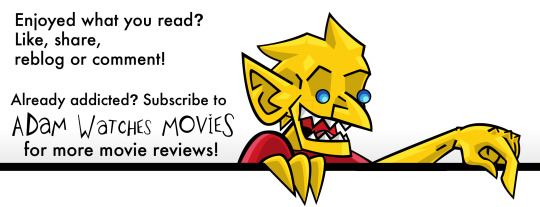
#The Karate Kid#movies#films#movie reviews#film reviews#John G. Avildsen#Robert Mark Kamen#Ralph Macchio#Noriyuki “Pat” Morita#Elisabeth Shue#William Zabka#Martin Kove#Randee Heller#1984 movies#1984 films
4 notes
·
View notes
Text

#The Karate Kid#Ralph Macchio#Pat Morita#Elisabeth Shue#William Zabka#Martin Kove#Randee Heller#John G. Avildsen#1984
2 notes
·
View notes
Text
Outta Da Ballpark
The term “masterpiece” gets bandied about a lot.
It’s come to mean the crème de la crème, the ne plus ultra of any creative soul, but the reality is it’s the benchmark that determines if you’re good enough to be considered a master.
In short, not the best, but better than anything you’ve done before.
In contemporary parlance, however, it means something universally recognized and acknowledged as the best of the best.
We can argue about how we define “best” but when we look at writers (and we’ll focus solely on novelists this time out), we can judge their output by their batting average.
In other words, how many times did they swing, and how many times did they score?
Like baseball, it’s possible to:
Swing and miss
Swing and hit but not get on base
Swing and hit a single / double / triple
Swing and hit a home run.
We’re going to focus just on the home runs (i.e., their best known works, the ones readers around the world instantly recognize to this day when you mention the title) and only those published in their lifetime (more than a few had completed manuscripts in the hopper when they died).
And I’m not interested in doubles or triples, as praiseworthy as they are. Nope, only clear cut outta-da-ballpark hits here, nothing less
Jane Austen Lifetime at bats: 4 books One home run: Pride And Prejudice
Mary Wollstonecraft Shelley Lifetime at bats: 6 books One home run: Frankenstein
Nathaniel Hawthorne Lifetime at bats: 17 books One home run: The Scarlet Letter
Charles Dickens Lifetime at bats: 22 books Four home runs: A Christmas Carol Oliver Twist Great Expectations A Tale Of Two Cities
Herman Melville Lifetime at bats: 11 books One home run: Moby Dick
Alexandre Dumas Lifetime at bats: 48 books Two home runs: The Three Musketeers The Count Of Monte Cristo
Victor Hugo Lifetime at bats: 11 books Two home runs: The Hunchback Of Notre Dame Les Miserables
Jules Verne Lifetime at bats: 54 books Four home runs: Journey To The Center Of The Earth From The Earth To The Moon + 20,000 Leagues Under The Sea Around The World In 80 Days
+ now typically published as one volume with its sequel All Around The Moon
Mark Twain Lifetime at bats: 41 books Two home runs: The Adventures Of Tom Sawyer The Adventures Of Huckleberry Finn
Booth Tarkington Lifetime at bats: 40 books Zero home runs
H.G. Wells Lifetime at bats: 51 books Three home runs: The Time Machine The War Of The Worlds The Invisible Man
Edgar Rice Burroughs Lifetime at bats: 71 books One home run: Tarzan Of The Apes
Ernest Hemingway Lifetime at bats: 9 books Three home runs: The Sun Also Rise A Farewell To Arms For Whom The Bell Tolls
John Steinbeck Lifetime at bats: 27 books Three home runs: Of Mice And Men The Grapes Of Wrath East Of Eden
Jack Kerouac Lifetime at bats: 14 books One home run: On The Road
Joseph Heller Lifetimes at bat: 6 books One home run: Catch-22
Ray Bradbury Lifetime at bats: 11 books + Two home runs: The Martian Chronicles Fahrenheit 451
+ counting only novels, not short story collections
For those asking “Where are Edgar Allen Poe and Arthur Conan-Doyle and Ian Fleming and Harlan Ellison?” the answer is they either wrote mostly short stories and no novels of lasting consequence, or they wrote series fiction, not standalone works, and while everyone knows who their series’ characters are, most people would be hard pressed to name a single novel from those series unless they had been filmed as mega-hit movies (Hound Of The Baskervilles excepted).
Burroughs gets mentioned because Tarzan Of The Apes is a fairly well written for an artefact of its era. He wrote several series of books, his pattern being to turn in two or three engrossing first volumes then, once on the hook for that $weet $weet $weet $equel $erie$ ca$h, started slumming out the follow-ups. Burroughs could write well when he put his mind to it, and his best later fiction are those rare occasions when he chose to indulge in wickedly insightful self-parody.
And for those wondering “Hoodafuq is Booth Tarkington?” the answer is one of the most famous, important, and influential American writers of the early to mid-20th century, a two-time Pulitzer Prize winner, and a popular dramatist as well as a novelist. Several of his works were adapted into motion pictures, the most famous being The Magnificent Ambersons as directed by Orson Welles. He’s on the list because despite his popularity and prestige in his lifetime, he and his works are virtually forgotten today.
There’s a reason for that, and one that ties in with why everybody else has at least one home run masterpiece to their credit:
“It’s not the job of the artist to give the audience what the audience wants. If the audience knew what they needed, then they wouldn’t be the audience. They would be the artists. It is the job of artists to give the audience what they need.” – Alan Moore
Before we proceed, let me state I deny no one their pleasure, I yuck no one else’s yum.* There’s certainly a place and purpose for popular entertainment, and since I’m the guy who read Lester Dent’s Doc Savage novel The Sargasso Ogre at least 20 times during my 13th summer, I’d be a hypocrite to say you can’t enjoy your favorite forms of pop culture.
And art can be gleefully entertaining, it’s not confined to somber despair laden tragedy and tsuris.
But art always possesses what Robert Hughes called “the shock of the new.” It makes us see and experience things we’ve never seen nor experienced before. Even when it’s a joyous celebration, it’s a celebration that’s fresh and insightful. Even when it’s set in a previous era, or a well known contemporary setting, it catches us by surprise.
Tarkington, a masterful writer, specialized in nostalgia. His works reject modernity not the way Burroughs gleefully rejected modernity with Tarzan, but rather turned his back on the present and condemned the future sight unseen.
Nothing he wrote surprises us.
It pleases us, and that’s nice and certainly worthy of praise…
…but it’s nothing we’re going to remember for long.
© Buzz Dixon
* Unless you enjoy harming children, animals, and innocent people, in which case f.u.
#writing#classics#literature#Ray Bradbury#Joseph Heller#Jack Kerouac#John Steinbeck#Ernest Hemingway#Edgar Rice Burroughs#H G Wells#Mark Twain#Booth Tarkington#Jules Verne#Victor Hugo#Alexandre Dumas#Herman Melville#Charles Dickens#Nathaniel Hawthorne#Mary Wollstonecraft Shelley#Jane Austen#masterpiece
1 note
·
View note
Text






"Six makes a Fix!" "Sixers make the Fixers!" "... we'll work on that."
Say hello to the severely understaffed bunches of Branch F - unguaranteed to assist the company's fixing/fixer needs!
The Time Traveller, or Time Traveller or Traveller if you're so in a rush, is designated Sinner 01-F AND the branch manager. No one's quite sure what their deal is with their T Corp getup, but they are a valuable asset when things go south and is quite the brilliant mind. Nobody knows their name, not even themself.
Winston Smith is designated Sinner 02-F, usually the one in charge of keeping records and documentations. Cautious and barely composed - he makes sure nobody tries to stab one another, to much failures.
Dorothy Parker is designated Sinner 03-F, mostly here to make things "lively" - which does involve copious amount of food and alcohol - with the fact that she's easily bored. As deadpan as she looks, she will ramble one's ears off on multiple occasions and judge anyone for... mostly everything and anything.
John Yossarian is designated Sinner 04-F, gets into all sorts of shenanigans and incomprehensible antics. Goes out his way to make excuses to not go on missions, failing almost every time. Acts as if everyone was out to kill him. (Probably true.)
Douglas Quail is designated Sinner 05-F, thankfully a rather normal one compared to everyone else. He's genuinely excited at the prospects of working for Limbus Company it almost seemed a bit strange. Her special interest is Mars and is not subtle over her obsession.
JS/07 M 378, JS or "Jayes" as the others call him, is designated Sinner 06-F, ironically. He's relatively new to the company. Nobody knows his actual name, or if he even had one - and frankly JS insisted it was never important. That aside, JS is obedient and hard-working to a fault. Rarely had he ever held his own opinions.
Did you guessed the literary sources correctly? I'm sure you did for some of them! :] In order:
The Time Machine - H. G. Wells
1984 - George Orwell
But The One on The Right - Dorothy Parker (Short story)
Catch-22 - Joseph Heller
We Can Remember It for You Wholesale - Philip K. Dick (Short story)
The Unknown Citizen - W. H. Auden (Poem)
Their company outfit and full infos will come in due time :] For now, I'm really happy with these.
Credit to @/threadtheocracy for the ID template.
#swanno arts#digital art#original character#oc#fan character#limbus company#limbus company oc#limbus oc#lcb oc#project moon#time traveller lcb#winston lcb#parker lcb#yossarian lcb#quail lcb#js/07 m 378 lcb
65 notes
·
View notes
Text
100 Books to Read Before I Die: Quest Order
The Lord Of The Rings by J. R. R. Tolkien
In Search of Lost Time by Marcel Proust
The Great Gatsby by F. Scott Fitzgerald
A Wrinkle in Time by Madeleine L’Engle
Jane Eyre by Charlotte Brontë
Pride and Prejudice by Jane Austen
Frankenstein by Mary Shelley
The Good Soldier by Ford Madox Ford
Under The Net by Iris Murdoch
American Pastoral by Philip Roth
The Unbearable Lightness of Being by Milan Kundera
Animal Farm by George Orwell
Housekeeping by Marilynne Robinson
Anna Karenina by Leo Tolstoy
Atonement by Ian McEwan
Crime And Punishment by Fyodor Dostoyevsky
The Grapes Of Wrath by John Steinbeck
Midnight’s Children by Salman Rushdie
Lucky Jim by Kingsley Amis
Slaughterhouse-Five by Kurt Vonnegut
The Sun Also Rises by Ernest Hemingway
Invisible Man by Ralph Ellison
A Passage to India by EM Forster
Of Human Bondage by W. Somerset Maugham
The Prime of Miss Jean Brodie by Muriel Spark
The Amazing Adventures of Kavalier and Clay by Michael Chabon
If on a Winter’s Night a Traveller by Italo Calvino
The Hitchhiker’s Guide to the Galaxy by Douglas Adams
1984 by George Orwell
White Noise by Don DeLillo
The Count of Monte Cristo by Alexandre Dumas
The Sound and the Fury by William Faulkner
The Stranger by Albert Camus
Lolita by Vladimir Nabokov
Oscar And Lucinda by Peter Carey
The Wind-Up Bird Chronicle by Haruki Murakami
Gulliver’s Travels by Jonathan Swift
Brave New World by Aldous Huxley
As I Lay Dying by William Faulkner
To Kill A Mockingbird by Harper Lee
Lord of the Flies by William Golding
The Portrait of a Lady by Henry James
The Call of the Wild by Jack London
Pale Fire by Vladimir Nabokov
Beloved by Toni Morrison
Tinker Tailor Soldier Spy by John Le Carré
Austerlitz by W. G. Sebald
The Scarlet Letter by Nathaniel Hawthorne
Brideshead Revisited by Evelyn Waugh
Tropic of Cancer by Henry Miller
The Age of Innocence by Edith Wharton
Mrs. Dalloway by Virginia Woolf
The Heart Is a Lonely Hunter by Carson McCullers
The Phantom Tollbooth by Norton Juster
Ulysses by James Joyce
Scoop by Evelyn Waugh
Haroun and the Sea of Stories by Salman Rushdie
Things Fall Apart by Chinua Achebe
Middlemarch by George Eliot
Are You There, God? It’s me, Margaret by Judy Blume
Clarissa by Samuel Richardson
Moby-Dick by Herman Melville
The Handmaid’s Tale by Margaret Atwood
Herzog by Saul Bellow
The Brief Wondrous Life of Oscar Wao by Junot Diaz
Wuthering Heights by Emily Brontë
Don Quixote by Miguel De Cervantes
A Bend in the River by V. S. Naipaul
A Dance to The Music of Time by Anthony Powell
The Strange Case of Dr Jekyll and Mr Hyde by Robert Louis Stevenson
Go Tell It On The Mountain by James Baldwin
Wide Sargasso Sea by Jean Rhys
Catch-22 by Joseph Heller
The Rainbow by D. H. Lawrence
Song of Solomon by Toni Morrison
I, Claudius by Robert Graves
Nostromo by Joseph Conrad
The Tin Drum by Gunter Grass
Madame Bovary by Gustave Flaubert
The Catcher in the Rye by JD Salinger
Charlotte’s Web by E. B. White
Tom Jones by Henry Fielding
His Dark Materials by Philip Pullman
Alice’s Adventures In Wonderland by Lewis Carroll
Little Women by Louisa M Alcott
Great Expectations by Charles Dickens
Portnoy’s Complaint by Philip Roth
Watchmen by Alan Moore
One Hundred Years of Solitude by Gabriel García Márquez
Robinson Crusoe by Daniel Defoe
Tristram Shandy by Laurence Sterne
On the Road by Jack Kerouac
The Big Sleep by Raymond Chandler
The Wind in the Willows by Kenneth Grahame
To the Lighthouse by Virginia Woolf
The Corrections by Jonathan Franzen
The Trial by Franz Kafka
Their Eyes Were Watching God by Zora Neale Hurston
Money by Martin Amis
David Copperfield by Charles Dickens
21 notes
·
View notes
Text
Incomplete list of depressing 20th century novels I read last year:
It Can't Happen Here by Sinclair Lewis (1935)
On the Beach by Neil Shute (1957)
The Pawnbroker by Edward Lewis Wallant (1961)
Catch-22 by Joseph Heller (1961)
Make Room! Make Room! by Harry Harrison (1966)
Roadside Picnic by Arkady and Boris Strugatsky (1972)
The Sheep Look Up by John Brunner (1972)
Concrete Island by J. G. Ballard (1974)
Incomplete list of depressing 20th century novels I'm reading this year:
The Well of Loneliness by Radclyffe Hall (1928) (it's public domain this year yeaahhhhhh!!!!!)
#i also got like 80% of the way thru american psycho but that didnt make me sad as much as sick#its well written but blegh#note to self: reread the afterlife diet sometime
4 notes
·
View notes
Text















Jesus - CBS - May 14 and 15, 2000
Historical Drama (2 episodes)
Running Time: 240 minutes
Stars:
Jeremy Sisto as Jesus
Jacqueline Bisset as Mary, mother of Jesus
Armin Mueller-Stahl as Joseph the carpenter
Debra Messing as Mary Magdalene
David O'Hara as John the Baptist
G. W. Bailey as Livio
Luca Barbareschi as Herod Antipas
Christian Kohlund as Caiaphas
Stefania Rocca as Mary of Bethany
Luca Zingaretti as Simon Peter
Ian Duncan as John, son of Zebedee
Elena Sofia Ricci as Herodias
Gilly Gilchrist as Andrew
Thomas Lockyer as Judas Iscariot
Claudio Amendola as Barabbas
Jeroen Krabbé as male Satan
Gary Oldman as Pontius Pilate
Gabriella Pession as Salome
Maria Cristina Heller as Martha
Manuela Ruggeri as female Satan
Peter Gevisser as Lazarus
Fabio Sartor as James, son of Zebedee
Sebastian Knapp as Matthew
Sean Harris as Thomas
Karim Doukkali as Philip
Said Bey as Jude Thaddeus
Abedelouhahad Mouaddine as James, son of Alphaeus
El Housseine Dejjiti as Simon the Zealot
Mohammed Taleb as Bartholomew
Omar Lahlou as Nathanael
Roger Hammond as Joseph of Arimathea
#Jesus#TV#CBS#Historical Drama#2000#Jeremy Sisto#Jacqueline Bisset#Armin Mueller-Stahl#Debra Messing#David O'Hara#G W Bailey
0 notes
Text
My Earth 2 Fanfiction
I keep most of my stuff on anon so I thought this would be a neat way to compile what I've done.
seasons change and i decay - Devon Adair - 292 words - G-889 didn't seem to like her very much.
Princess - Devon Adair/Bess Martin (one-sided) - 263 words - Everyone assumed her dream had been about another man.
Pouring from an Empty Cup - Devon Adair/Julia Heller - 973 words - Julia works day and night to find a cure when the crew gets sick again. Devon thinks she should rest instead.
Stages - Devon Adair & Uly Adair, Devon Adair & Yale - 635 words - If it weren't for Yale, Devon would come home to an empty unit. He's there when Uly isn't, when Devon had permission to be a person who's hurting rather than a mother who's strong.
Wildflower - Bess Martin - 898 words - On the road to New Pacifica, Bess reflects on her life.
Come So Far - John Danziger & True Danziger - 1,380 words - Danziger never took care of himself right, and True never let him get away with it.
Desiccation - Bess Martin - 749 words - "Have you ever watched anyone trying to eat dirt? Trying to suck the moisture out of mud?"
Possessed - Julia Heller - 1,291 words - Danziger's actions while possessed bring back unpleasant memories for Julia.
1 note
·
View note
Text
Avid Reader is the memoir of Robert Gottlieb, who was a New York publishing bigwig in the second half of the twentieth century. Obviously he read huge numbers of new books as they were coming out. And then as now, so much stuff was published that a lot of good books were quickly forgotten after their moment in the sun.
I’ve been keeping a list of novels that Gottlieb enthuses about but I had never heard of (or the author is famous for one book and he’s raving about a different one). He has really wide-ranging tastes, so this list has a little bit of everything. Sometimes he doesn’t even mention the genre, just how good the book was.
It will probably take me years to get round to all these, if ever.
If anyone’s looking for a reading project, may I present to you: The Avid Reader incomplete list of neglected novels
Niccolo Tucci, Before My Time (autobiographical novel by a writer who left fascist Italy - praised by Dorothy Parker)
Sybille Bedford, A Legacy (about German aristocrats - Nancy Mitford loved this one)
Rona Jaffe, The Best of Everything (young women juggling career and life in 50s New York, sounds a bit like a pre-women’s-lib Sex and the City)
Sylvia Ashton-Warner, Spinster (autobiographical novel by a New Zealand teacher trying to make school better for her Maori pupils)
Mordecai Richler, Barney’s Version
Bruce Jay Friedman, Stern
Jetta Carleton, The Moonflower Vine (an American farming family with a secret)
Robert Crichton, The Secret of Santa Vittoria (villagers try to outwit Nazis in WWII)
Chaim Potok, The Chosen (two Jewish boys growing up in Brooklyn)
Charles Portis, True Grit (source novel for the Western film)
John Cheever, Bullet Park (“dark and obscure”)
Lisa Alther, Kinflicks
Ross Macdonald (crime writer, no specific title was mentioned)
William Wharton, Birdy
Dorothy Dunnett, British writer of historical fiction, The Game of Kings (start of a series) or King Hereafter (standalone)
Joseph Heller, Something Happened
L G Buchheim, The Boat (translated from German, source novel for the film Das Boot)
Tom Tryon, The Other (psychological horror)
Robert Stone, A Flag for Sunrise
Evan Connell, Mr Bridge
1 note
·
View note
Video
youtube
Liked on YouTube: We Need to Talk About Boomers || https://www.youtube.com/watch?v=HJl83vNuDL4 || Okay Boomer! Okay Millennials! Let's talk about how older adults are a marginalised group, how ageism is a socially acceptable form of bigotry, and how the generation war narrative helps capitalists. And while we're at it, let's make a vegan Irish stew with Guinness, and let's talk to our Dads because they're cool. Support the channel on Patreon ►► https://ift.tt/UfXFsc8 References: Arcoverde, C., Deslandes, A., Rangel, A., Rangel, A., Pavão, R., Nigri, F., Engelhardt, E. & Laks, J. (2008). Role of physical activity on the maintenance of cognition and activities of daily living in elderly with Alzheimer's disease. Arquivos de neuro-psiquiatria, 66(2B), 323-327. Babyak, M., Blumenthal, J.A., Herman, S., Khatri, P., Doraiswamy, M., Moore, K., Craighead, W.E., Baldewicz, T.T. & Krishnan, K.R. (2000). Exercise treatment for major depression: maintenance of therapeutic benefit at 10 months. Psychosomatic Medicine, 62(5), 633-638. Butler, R. N. (1969). Ageism: Another form of bigotry. The Gerontologist, 9(4), 243–246 Burton, E. and Mitchell, L. (2006). Inclusive urban design: Streets for life. Elsevier. Fisher, M. (2009). Capitalist realism: Is there no alternative?. John Hunt Publishing. Fukuyama, F. (1989). The end of history?. The national interest, (16), 3-18. Greenberg, L., 1982. The implication of an ageing population for land-use planning. Geographical Perspectives on the Elderly, 401-425. Grusky DB, Mattingly M, Varner C, et al. (2019) Millennials in the United States. In Stanford Center on Poverty and Inequality (eds.) State of the Union: The Poverty and Inequality Report. Pathways Magazine, 3–6. Hamilton, M., & Hamilton, C. (2006). Baby boomers and retirement. Dreams, fears, and anxieties. Sydney: The Australian Institute. Ipingbemi, O. (2010). Travel characteristics and mobility constraints of the elderly in Ibadan, Nigeria. Journal of Transport Geography, 18(2), 285-291. King, A., & Almack, K. (2019). Intersections of ageing, gender, sexualities: Multidisciplinary international perspectives. 17 Leigh-Hunt, N., Bagguley, D., Bash, K., Turner, V., Turnbull, S., Valtorta, N., & Caan, W. (2017). An overview of systematic reviews on the public health consequences of social isolation and loneliness. Public health, 152, 157-171 Li, Z., & Dalaker, J. (2019). Poverty among Americans aged 65 and older. Washington, DC: Congressional Research Service. Lim, Y. J., & Lemanski, J. (2020). A generational war is launched with the birth of Ok Boomer in the digital age. The Journal of Society and Media, 4(1). Marottoli, R. A., De Leon, C. F. M., Glass, T. A., Williams, C. S., Cooney Jr, L. M., Berkman, L. F., & Tinetti, M. E. (1997). Driving cessation and increased depressive symptoms: Prospective evidence from the New Haven EPESE. Journal of the American Geriatrics Society, 45(2), 202-206. Mueller, J. C., & McCollum, J. (2021). A Sociological Analysis of “OK Boomer”. Critical Sociology, 08969205211025724. Nordbakke, S. (2013). Capabilities for mobility among urban older women: barriers, strategies and options. Journal of transport geography, 26, 166-174. Pinquart, M., & Sörensen, S. (2000). Influences of socioeconomic status, social network, and competence on subjective well-being in later life: a meta-analysis. Psychology and aging, 15(2), 187. Pope, S.K., Shue, V.M. & Beck, C. (2003). Will a healthy lifestyle help prevent Alzheimer's disease?. Annual Review of Public Health, 24(1), 111-132. Quoidbach, J., Gilbert, D. T., & Wilson, T. D. (2013). The End of History Illusion. Science, 339(6115), 96–98. Röhr, S., Rodriguez, F. S., Siemensmeyer, R., Müller, F., Romero‐Ortuno, R., & Riedel‐Heller, S. G. (2022). How can urban environments support dementia risk reduction? A qualitative study. International journal of geriatric psychiatry, 37(1). Troya, M. I., Babatunde, O., Polidano, K., Bartlam, B., McCloskey, E., Dikomitis, L., & Chew-Graham, C. A. (2019). Self-harm in older adults: systematic review. The British Journal of Psychiatry, 214(4), 186-200. Troya, M. I., Dikomitis, L., Babatunde, O. O., Bartlam, B., & Chew-Graham, C. A. (2019). Understanding self-harm in older adults: a qualitative study. EClinicalMedicine, 12, 52-61. World Health Organization (WHO). (2016) Mental Health and older adults. Media Centre Fact Sheets. World Health Organization. World Health Organization (WHO). (2021). Global report on ageism. Yasamy, M. T., Dua, T., Harper, M., & Saxena, S. (2013). Mental health of older adults, addressing a growing concern. Mental health and older people, 4-9. Yon, Y., Mikton, C. R., Gassoumis, Z. D., & Wilber, K. H. (2017). Elder abuse prevalence in community settings: a systematic review and meta-analysis. The Lancet Global Health, 5(2), e147-e156. Yon, Y., Ramiro-Gonzalez, M., Mikton, C. R., Huber, M., & Sethi, D. (2019). The prevalence of elder abuse in institutional settings: a systematic review and meta-analysis. European journal of public health, 29(1), 58-67.
0 notes
Text
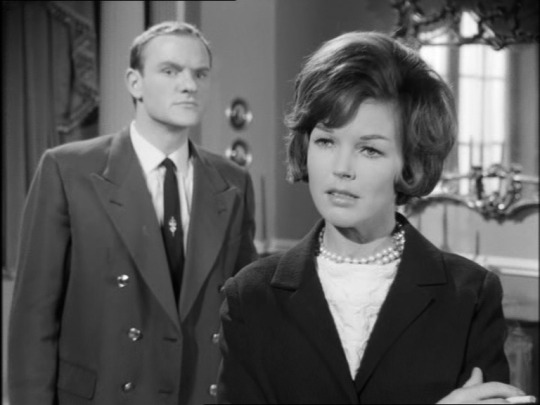
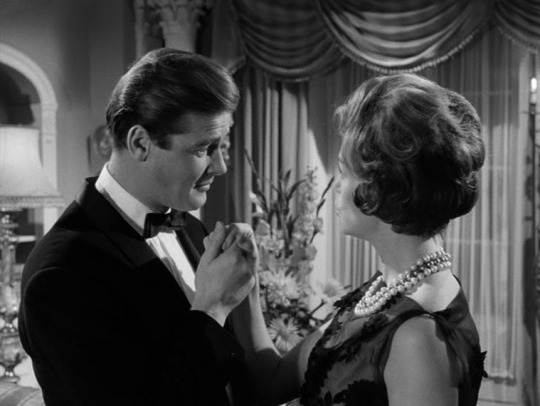

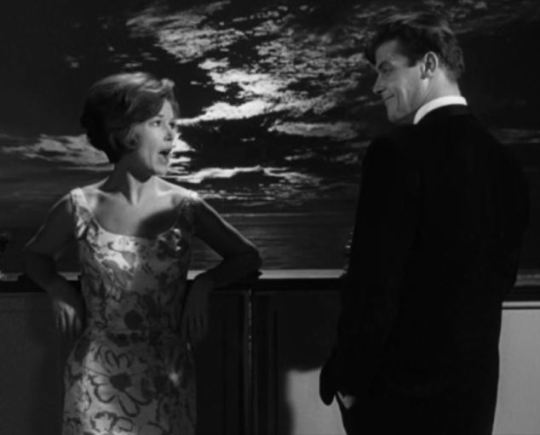
The Saint: The Lawless Lady (2.20, ITC, 1964)
"Why don't you join us?"
"Who's he?"
"A friend."
"Oh?"
"Yes, some people have them."
#the saint#the lawless lady#1964#leslie charteris#harry w. junkin#jeremy summers#roger moore#dawn addams#julian glover#ivor dean#ronald ibbs#john g. heller#david sumner#james belchamber#anthea wyndham#kenneth benda#dorothy black#stuart saunders#anne sharp#gerald young#edith saville#adapted from a Charteris novella in which the Saint is only a minor character and the hero is Dicky Tremaine (the character here played in#brief by David Sumner). the writers seem to have taken a very loose approach to this story‚ keeping only the title and a few basic elements#as well as reusing the basic shape of series 1's The Charitable Countess (right down to some expositionary dialogue). this one begins i#should add‚ with one of Simon's most cringe induicing and mercilessly sexist monologues yet‚ on the subject of women drivers (it's as bad#as it sounds) but the ep itself isn't bad; like i say‚ a basic retread of 1.12 but with the added bonus of Inspector Teal (it's been a#while!) and a deliciously vicious turn from Julian Glover as a sour faced henchman who's quick with his fists. the fistfight between#Glover and Moore at the end of the episode is one of the most brutal yet. Moore and Addams had notably good chemistry in her previous ep#(2.1‚ The Fellow Traveller) and they rekindle it here. of the many women to fall hopelessly in love with Simon Templer‚ she's perhaps the#most convincing (even if she could do better imo....)
6 notes
·
View notes
Text





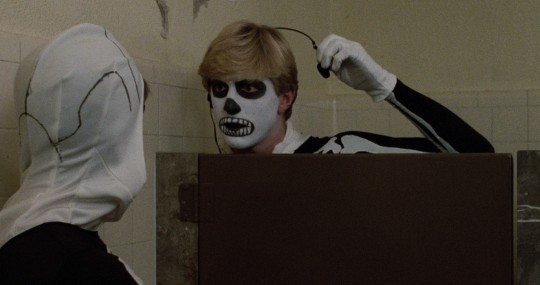

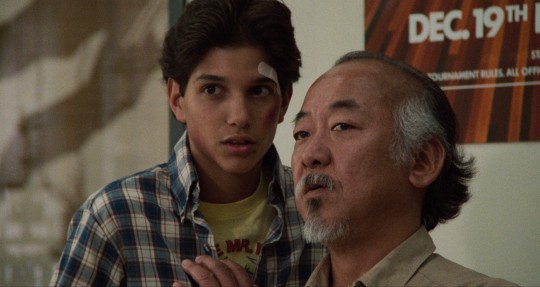

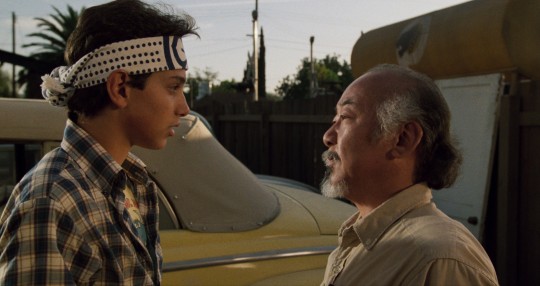
t h e k a r a t e k i d, 1984 🎬 dir. john g. avildsen
#film#the karate kid#the karate kid 1984#john g. avildsen#ralph macchio#pat morita#william zabka#martin kove#Randee Heller#daniel larusso#mr. miyagi
55 notes
·
View notes
Text

The Karate Kid (1984)
10 notes
·
View notes
Photo
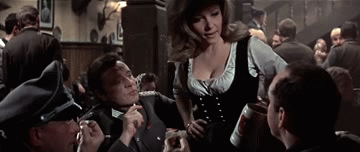
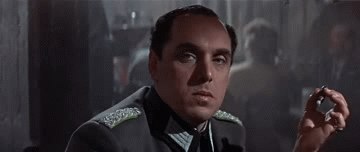


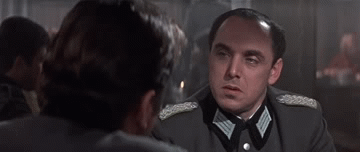
The name of the alpine rose was Ingrid Pitt, but she was born Ingoushka Petrov in Warsaw. She and her family had been imprisoned in the Stutthof concentration camp during the war, so it’s not hard to understand that she found working on this movie somewhat uncomfortable, as she was constantly surrounded by men in German uniforms.
6 notes
·
View notes
Text
It's been two years, how long is Ocean on Fire Now
Hi! It's me again. Maybe you'll remember when I compared the length of Ocean on Fire to the Candy Makers? Well, it's been over two years, so it's time to do that again.
As of typing this, you've reached a word count of 313,314. First of all, holy shit. Second of all, here's some context of how long that is.
A person could read the 2nd, 3rd and 4th Harry Potter books in less time than they could read Ocean on Fire.
The following books all have smaller word counts than Ocean on Fire.
To Kill a Mockingbird, Harper Lee – 100,388 words
Gullivers Travels, Jonathan Swift – 107,349 words
Wuthering Heights, Emily Bronte – 107,945 words
The Adventures of Huckleberry Finn, Mark Twain – 109,571 words
As I Lay Dying, William Faulkner – 56,695 words
Lord of the Flies, William Golding – 59,900 words
Mrs Dalloway, Virginia Wolf – 63,422 words
Black Beauty, Anna Sewell – 59,635 words
The Colour Purple, Alice Walker – 66,556 words
Treasure Island, Robert Louis Stevenson – 66,950 words
The Sun Also Rises, Ernest Hemingway – 67,707 words
The Picture of Dorian Gray, Oscar Wilde – 78,462 words
Ulysses, James Joyce – 265,222 words
Great Expectations, Charles Dickens – 183,349 words
Moby Dick, Herman Melville – 206,052 words
For Whom the Bell Tolls, Ernest Hemingway – 174,106 words
Memoirs of a Geisha, Arthur Golden – 186,418 words
Jane Eyre, Charlotte Brontë – 183,858 words
Catch-22, Joseph Heller – 174,269 words
Sense and Sensibility, Jane Austen – 126,194 words
Atonement, Ian McEwan – 123,378 words
Crime and Punishment, Fyodor Dostoyevsky – 211,591 words
The Grapes of Wrath, John Steinbeck – 169,481 words
One Hundred Years of Solitude, Gabriel Garcia Marquez – 144,523 words
The Time Traveller’s Wife, Audrey Niffenegger – 155,717 words
Fahrenheit 451, Ray Bradbury – 46,118 words
The Martian Chronicles, Ray Bradbury – 64,768 words
Brave New World, Aldous Huxley – 63,766 words
War of the Worlds, G. Well – 59,796 words
The Time Machine, G. Well – 32,149 words
Nineteen Eight-Four, George Orwell – 88,942 words
Dune, Frank Herbert – 187,240 words
The Left Hand of Darkness, Ursula K. Le Guin – 94,240 words
Do Androids Dream of Electric Sheep, Phillip K. Dick – 79,360 words
Frankenstein, Mary Shelley – 74,800 words
If you want an equivalent thickness, combine all but one of the Chronicles of Narnia books, and you'd have a decent idea (the Chronicles of Narnia books would be about 8,000 words short)
Now what's the appropriate take away from this? Simple.
1) You're incredibly talented.
2) If you were to bind Oceans on Fire into a book, it would be an excellent blunt weapon.
Thank you for coming to my TEDtalk. I look forward to 2023 by then I assume you will have exceeded the word count of Les Mis.
The Ninja Response

HOLY- WHAT??
Ok, this is incredible work and seeing it all laid out like this?? This is an INSANE confidence boost, holy cow.
Also I would indeed like to bind OoF to make a blunt weapon, that's on my bucket list now thank you
#submission#MY DUDE#i'm blown away by all the research you did??#thank you again!!#now I feel better about how much time it's taken me to write#OoF extras
28 notes
·
View notes